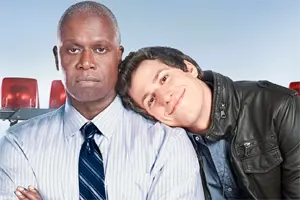Brooklyn Nine-Nine was a comedy gift that woudn't have survived as long in another TV era
-

"I’m going to miss the series, which over its run probably gave me more pure pleasure than anything else airing concurrently anywhere on the dial," says Alyssa Rosenberg. "And I’m so grateful that we got as many episodes of it as we did." She points out that Brooklyn Nine-Nine wouldn't have made it to 112 episodes with its low ratings in another television era. Brooklyn Nine-Nine, she says, "was a model for what pop culture can do when it is committed to showcasing a wider range of characters and their stories." It was diverse in a unique way. There were two black cops, instead of one. Two Latina cops, instead of one. Two non-straight cops, instead of one. "None of those characters ever had to carry the weight of representing those entire communities," says Rosenberg. She adds: "While Brooklyn Nine-Nine was a comedy about cops, it approached the actual work of policing with seriousness and moral rigor. It was a task that might have doomed a lesser show, especially one that aired during a period when police killings of unarmed black Americans spurred a national movement. Brooklyn Nine-Nine tried to model what good policing could look like at a time when even that act of idealism sometimes seemed like a farce ... Brooklyn Nine-Nine was never solely an issue show, but its commitment to approaching policing from an ethical place was fundamental to its sense of decency, a quality which was itself fundamental to the series."
ALSO:
- Could Brooklyn Nine-Nine find a new home? Hulu is the most likely destination, followed by TBS (whose president developed the show)
- NBC and Netflix could also potentially revive Brooklyn Nine-Nine
- The Internet is losing its mind over the Brooklyn Nine-Nine cancellation
- Why the Internet freakout for a show averaging fewer than 2 million viewers?
- Is Tim Allen to blame? Fox's comedy bloodbath comes amid talk of a Last Man Standing revival
- Seth Meyers calls the cancelations of his former SNL colleagues' shows a "double gut punch"
- Brooklyn Nine-Nine co-creator Dan Goor tweets: "#brooklyn99 fans are the best fans in the world"
- Melissa Fumero: "These last 5 years have been incredible"
- Stephanie Beatriz: "What a gift this series has been: it’s been my honor. Your sadness is noted"
- Joe Lo Truglio: "I’m so very lucky, so deeply thankful to have been part of a show that has brought so much joy to so many"
- Lin-Manuel Miranda wants fans to fight for the show: "I ONLY WATCH LIKE 4 THINGS ... THIS IS ONE OF THE THINGS"
- Mark Hamill: "Be forewarned @FOXTV-when networks dump shows I love, I'm known for holding grudges a long, L-O-N-G time"
- Backstreet Boys: "Thanks for the memories, #Brooklyn99"
- Sean Astin: "They earned the right 2 have a final season victory lap where I could emotionally prepare"
- Guillermo del Toro: "The world is better with this show in it. I love these characters and the healing good energy B99 brings"
TOPICS: Brooklyn Nine-Nine, FOX, Hulu, TBS, Dan Goor, Guillermo del Toro, Joe Lo Truglio, Lin-Manuel Miranda, Mark Hamill, Melissa Fumero, Sean Astin, Seth Meyers, Stephanie Beatriz, Tim Allen, Cancelations, Renewals & Pickups
More Brooklyn Nine-Nine on Primetimer:
